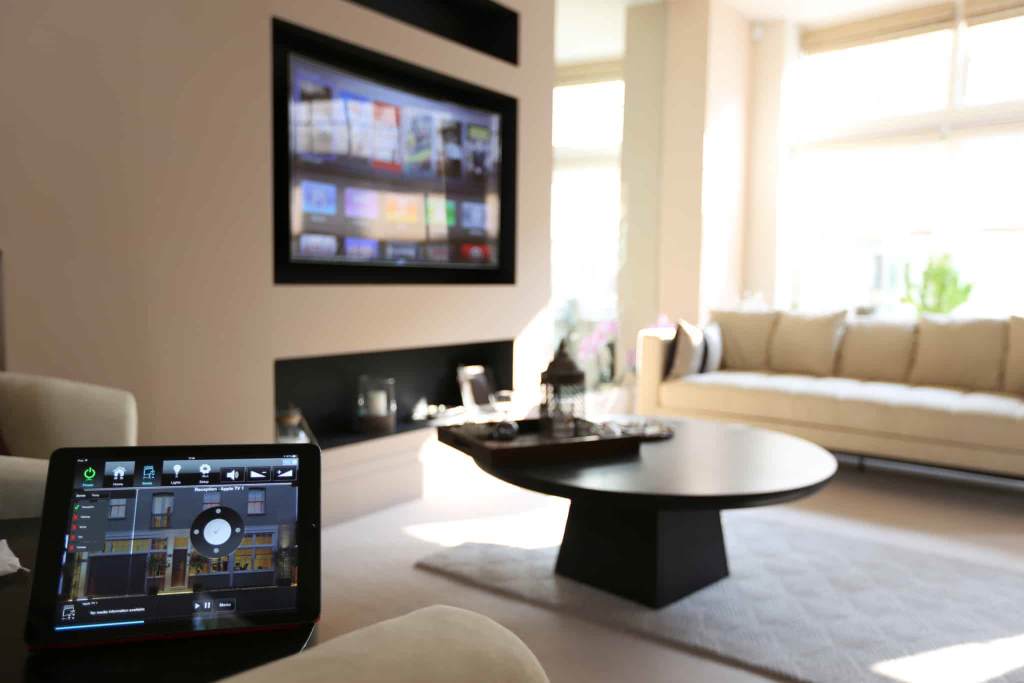Imagine walking into your home, and before you step inside, lights adjust to your preferred brightness, the thermostat sets the perfect temperature, and your favorite playlist starts—all without lifting a finger. This isn’t science fiction; it’s the reality of AI-powered high-end home automation systems.
Artificial Intelligence (AI) is transforming luxury smart homes, making them more intuitive, efficient, and secure. From voice-controlled assistants to predictive climate control, AI is redefining modern living. In this article, we’ll explore how AI is revolutionizing high-end home automation, its key benefits, top technologies, and what the future holds for smart homes.
How AI is Revolutionizing High-End Home Automation
1. Smarter Voice Assistants & Natural Language Processing (NLP)
Gone are the days of rigid voice commands. AI-driven assistants like Amazon Alexa, Google Assistant, and Apple’s Siri use Natural Language Processing (NLP) to understand context, learn user preferences, and respond naturally.
- Personalized responses – AI remembers user habits and tailors interactions.
- Multi-language support – Understands and responds in various languages seamlessly.
- Predictive actions – Suggests routines based on behavior (e.g., turning off lights when you say “goodnight”).
2. Predictive Automation & Machine Learning
AI doesn’t just follow commands—it anticipates them. Using machine learning, smart home systems analyze patterns to automate tasks before you think of them.
- Smart thermostats (like Nest or Ecobee) learn your schedule and adjust temperatures for comfort and energy savings.
- Lighting systems (such as Lutron or Philips Hue) adapt based on time, occupancy, and weather conditions.
- Security enhancements – AI-powered cameras (like Google Nest Cam) differentiate between family, pets, and intruders, reducing false alarms.
3. Enhanced Security with AI-Powered Surveillance
High-end home automation integrates AI-driven facial recognition, anomaly detection, and real-time alerts for unparalleled security.
- Facial recognition – Systems like Ring Alarm Pro identify known vs. unknown visitors.
- Anomaly detection – AI flags unusual activity (e.g., a door left open at odd hours).
- Automated emergency responses – Some systems alert authorities if a break-in or fire is detected.
4. Energy Efficiency & Sustainable Smart Homes
AI optimizes energy consumption, reducing costs and environmental impact.
- Smart grids & energy management – AI balances energy use across solar panels, batteries, and the grid.
- Automated appliance control – AI shuts off unused devices to prevent “vampire energy” drain.
- Water conservation – Smart irrigation systems (like Rachio) adjust watering based on weather forecasts.
5. Seamless Integration with IoT Devices
The Internet of Things (IoT) is the backbone of AI home automation. AI acts as the brain, connecting and controlling:
- Smart locks (e.g., August or Yale)
- Voice-controlled blinds (like Serena by Lutron)
- AI-powered kitchens (smart fridges that track expiration dates, ovens that adjust cooking times)
Top AI-Powered Home Automation Systems in 2024
| System | Key Features | Best For |
|---|---|---|
| Amazon Alexa | Voice control, multi-room audio, smart routines | Whole-home automation |
| Google Home | AI-driven suggestions, Google integration | Families & tech enthusiasts |
| Apple HomeKit | High privacy standards, Siri integration | Apple ecosystem users |
| Control4 | Customizable luxury automation, pro installation | High-end smart homes |
| Savant | AI-powered energy management, premium design | Luxury estates |
Challenges & Considerations for AI Home Automation
While AI brings incredible benefits, there are challenges to consider:
- Privacy concerns – Always-on microphones and cameras raise data security questions.
- High costs – Premium AI automation systems require significant investment.
- Integration complexity – Not all devices are compatible with every ecosystem.
- Dependence on internet – A stable connection is crucial for real-time AI responses.
Pro Tip: Opt for systems with local processing (like Apple HomeKit) to reduce cloud dependency and enhance privacy.
Read Also:
- What is the difference between steam cleaning and dry cleaning a carpet?
- How Magento Helps You Stay Ahead in a Competitive Digital Market
- Top Benefits of Product Development Services for Smart Manufacturing in 2025
The Future of AI in Smart Homes: What’s Next?
The evolution of AI in home automation is accelerating. Here’s what to expect:
- Emotion Recognition – AI may detect mood changes and adjust lighting/music accordingly.
- Advanced Robotics – Domestic robots (like Samsung Bot Handy) could handle chores autonomously.
- Self-Healing Homes – AI could predict maintenance issues (e.g., plumbing leaks) before they occur.
- Hyper-Personalization – AI will tailor every aspect of the home environment to individual preferences.
Conclusion: Is an AI-Powered Smart Home Right for You?
AI is no longer a luxury—it’s becoming a standard in high-end home automation. With benefits like enhanced security, energy savings, and unparalleled convenience, AI-driven smart homes offer a glimpse into the future of living.
Ready to upgrade your home? Start by exploring voice assistants, smart thermostats, or security systems, and gradually build your AI-powered ecosystem.
Want to transform your home into a futuristic smart haven? Book a consultation with a smart home expert today or check out our top-rated AI automation systems to get started!





+ There are no comments
Add yours